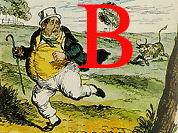
odies matter across the range of Dickens’s writings. In fiction, his characters are frequently identified with their bodily gestures and movements, such as Uriah Heep’s writhing, or Jaggers biting his forefinger. Bodies come in all shapes, sizes and permutations: from Joe the fat boy, to Krook’s combustible body, to the one-eyed Wackford Squeers, or the hook-handed Captain Cuttle. Bodies are the source of employment and even artistry: Prince Turveydrop teaches dancing, Alice Marwood sells her body, Jenny Wren models her dolls on live subjects, while Mr Venus articulates skeletons ‘in a manner that would equally surprise and charm you’. Bodies circulate, permeate and linger: Peggotty’s breath down the keyhole tickles David Copperfield’s face, while Phil Squod’s shoulder leaves a smear round the four walls of George’s Shooting Gallery. But bodies can be hidden as well as evoked by language: Estella’s first appearance is signalled by her candle coming ‘along the dark passage like a star’.
In life Dickens’s career was shaped by embodiment, from the childhood sickliness that inclined him to reading, to the restless walking that accompanied and fuelled his writing, and the physical overstimulation that cut short his public readings. His letters and journalism reveal his interest in medical advances for managing and healing the body, as well as his fascination with the decaying corpses of the Paris morgue. They also show his awareness of the role of the body in Victorian celebrity and relic culture and the burgeoning heritage industry.
Jointly run by Birkbeck, Cardiff University, the Dickens Fellowship and the Institute of English Studies, this one-day conference will explore all aspects of Dickens and Bodies. We invite proposals for 20-minute papers in response to the theme and warmly encourage Dickensians and scholars of all backgrounds and career stages to apply.
Topics could include but are not limited to:
- Caricature, melodrama, clowning; gesture and bodily repertoires
- Comic bodies
- Embarrassing bodies
- Body parts
- Dickens’s own body
- The medical and scientific body
- The disabled body
- The fluid, circulating or lingering body: tears, handshakes, breath, contagion, bodily traces and mementoes
- The body in stasis and motion: paralysis, movement, dance
- Macabre or grotesque bodies
- The body in pain or sickness; the body in health
- Appetite and hunger
- Dead bodies
- The body as commodity
- The desiring body
- The body politic
Please send proposals (maximum 500 words) to Bethan Carney, Holly Furneaux, Lucy Whitehead and Ben Winyard at dickensdayuk@gmail.com The deadline for paper proposals is 31st May 2019.
Last modified April 12, 2019